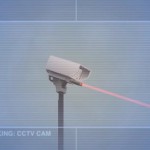 I have written over the years about the encroaching surveillance state, the spread of CCTV and the increasing use of drones in our skies. When the North East of England introduced talking CCTV cameras that could bark orders at passing pedestrians in 2008, I thought that we were fast approaching the reductio ad absurdum point — and indeed this subject has raised a wry laugh from audiences around the world ever since.
I have written over the years about the encroaching surveillance state, the spread of CCTV and the increasing use of drones in our skies. When the North East of England introduced talking CCTV cameras that could bark orders at passing pedestrians in 2008, I thought that we were fast approaching the reductio ad absurdum point — and indeed this subject has raised a wry laugh from audiences around the world ever since.
Recently I have been reading with dismay a slew of articles about the increasing corporatisation of the surveillance state. First I stumbled across a piece describing Facebook’s latest innovation, Facedeal: cameras planted in shops and bars that will use the facial recognition and tagging abilities of FB to recognise you as a valued customer and offer you a discount, simply because you have signed up to this Big Brother app on Facebook.
Add this to the fact that Facebook is probably, well, an open book for to the entire US security apparatus, and you can see the potential abuse of this system. We shall effectively be bribed to allow ourselves to be spied on.
 Facedeal is being trialed in the US. Some European countries, most notably Germany, have already stated that data recognition technology used even just for photo “tagging” is or could be deemed illegal. Germany specifically has regulations that allow Internet users control over their data. They are not going to like Facedeal.
Facedeal is being trialed in the US. Some European countries, most notably Germany, have already stated that data recognition technology used even just for photo “tagging” is or could be deemed illegal. Germany specifically has regulations that allow Internet users control over their data. They are not going to like Facedeal.
Secondly, it was reported today that Google had patented intelligent image recognition technology. Combine this capability with Googles Earth and Street, and we are potentially looking at a truly panopticon society. The Germans are really not going to like that. (Nor indeed will certain of the French, including the man who earlier this year tried to sue Google after being photographed having a pee in his own front garden).
Thirdly, Boeing has triumphantly launched the concept of the drone swarm, operating with a hive mentality and upping the capabilities of military surveillance exponentially, while taking much of the risk out of any operation.
 And finally, the Wikileaks story about TrapWire. This first emerged as yet another bonkers American scheme, where the footage from CCTV street cameras was being mainlined into the security apparatus. Subsequently, it has emerged via Wikileaks that Trapwire is also being used in other western countries, including the UK.
And finally, the Wikileaks story about TrapWire. This first emerged as yet another bonkers American scheme, where the footage from CCTV street cameras was being mainlined into the security apparatus. Subsequently, it has emerged via Wikileaks that Trapwire is also being used in other western countries, including the UK.
Not only can the securocrats watch you, they too are installing face recognition software that can identify you. While this may not yet be as accurate as the spies might wish, TrapWire has also installed predictive software that apparently can assess whether you are acting, loitering or walking in a suspicious manner. So you could pre-emptively be assessed to be about to commit a crime or an act of terrorism and, no doubt, appropriately and pre-emptively “dealt with”.
All of which must be so reassuring to protest groups such as Occupy, which have been subject to massive CCTV surveillance in NYC and which have been labelled a “terrorist/extremist threat” in the City of London.
At the risk of sounding alarmist, we now all know what “being dealt with” in this era of anti-activist SWAT teams, drone strikes and kill lists can potentially entail.
So where does this leave us as concerned citizens? It strikes me that we are being catapulted into some sci-fi dystopia beyond even Orwell’s wildest imaginings. Any fan of modern thrillers and sci-fi will be familiar with the concept of integrated super-computers that can watch our every move via CCTV.
 The latter is what TrapWire et al are working towards. These new technologies remind me of a story line from a wonderful series of books called the The Laundry Files by Charles Stross. These novels are a perfect of merging of Len Deighton’s laconic spy fiction, à la Harry Palmer, with the geek universe and beyond. And, at the risk of a spoiler, one of the story lines envisages a centralised and weaponised CCTV system, mainlining into the secret services, that can be turned on UK citizens if the balloon goes up. This system is codenamed the “Scorpion Stare”.
The latter is what TrapWire et al are working towards. These new technologies remind me of a story line from a wonderful series of books called the The Laundry Files by Charles Stross. These novels are a perfect of merging of Len Deighton’s laconic spy fiction, à la Harry Palmer, with the geek universe and beyond. And, at the risk of a spoiler, one of the story lines envisages a centralised and weaponised CCTV system, mainlining into the secret services, that can be turned on UK citizens if the balloon goes up. This system is codenamed the “Scorpion Stare”.
Sounds far-fetched? Well The Laundry Files are a rollicking good read, but do bear in mind not only that our CCTV systems may be centralised courtesy of TrapWire, but also that various law enforcement agencies in the UK are using micro-drones to spy on protesters, and that they have reportedly enquired if these drones could be weaponised.….
So it all depends on how you define the balloon, I suppose.
Published in The Huffington Post UK, 3 September 2012


